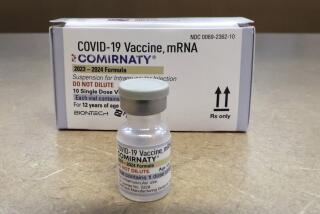Panel Urges Medicare to Expedite Review of New Technology, Coverages
- Share via
In the wake of a California man’s successful bid to receive Medicare reimbursement for a new type of heart operation, a national panel studying how the Medicare program pays for new medical technology Wednesday recommended that U.S. agencies quicken their review of new procedures and allow more public scrutiny of the murky process.
“Everybody wants to be sure to get the finest and best in new medical technology,” said Helen King Cummings, a member of the 10-member National Advisory Council on Health Care Technology Assessment that submitted the report to Otis Bowen, secretary of Health and Human Services.
“Generally Medicare coverage rules are a real trend-setter,” Cummings added. “We hope our recommendations will be adopted to help streamline and open up the process (because) for most people there is just this big black box of mystery.”
The report comes five years after Modesto furniture salesman Bernard Jameson, 71, filed a lawsuit in federal court seeking reimbursement for a balloon catheter heart operation. The Health Care Financing Administration, terming the device “experimental” refused to pay. It reached an out-of-court settlement with Jameson last year.
Bowen could not be reached for comment late Tuesday. But experts say many of the recommendations could be implemented internally by the secretary or more formally in conjunction with a separate rule-making begun last year by the Health Care Financing Administration. The rule-making is aimed at clarifying HCFA’s murky but influential Medicare coverage rules on such new technologies as $75,000 liver transplants or $15,000 artificial ear operations.
The coverage debate has been brewing since the 21-year-old Medicare program began imposing economy measures on physicians and hospitals in 1983 after years of reimbursing them fully.
Critics have claimed that the coverage rules prevent the nation’s 31 million Medicare recipients from getting state-of-the-art medical treatment and frustrate innovation by medical equipment manufacturers because they are not uniform and not subject to public scrutiny.
“These recommendations may open up a window, but I wouldn’t characterize it as . . . opening up the front door,” said Gordon B. Schatz, associate general counsel for the Health Industry Manufacturers Assn. in Washington. “We are quite interested in the response of the secretary of health to these recommendations.”
“Any opening up of the process is welcome and is something that will make medical technology more quickly available,” added Sally Hart Wilson, staff attorney with the Los Angeles-based National Senior Citizens Law Center. “Coverage rules shouldn’t be as restrictive as they currently are.”
Nearly 18 months in the making, the 65-page report lists 23 recommendations for expediting the review of new medical technology. Noting that it took an average 2.4 years for devices to complete the entire review process between 1983 and 1988, for instance, the report calls for “clearer criteria” for making the required decisions.
The report also says that HCFA should “allow the public to have a better understanding of the internal HCFA review process” and “publish at least a quarterly list of technologies under review.”
A policy-making HCFA official with responsibility for Medicare reimbursement said the agency is considering going beyond the council’s recommendations.
The official said, for example, that the agency is considering a rule that would require contractors, who make reimbursement decisions on behalf of HCFA, to have physicians on their review panels instead of just laymen.
“Our regulations are proposing much broader changes,” the official said. “The report is narrowly focused on processing time and making the technology review more open. We hope to change the process a lot more.”
More to Read
Sign up for Essential California
The most important California stories and recommendations in your inbox every morning.
You may occasionally receive promotional content from the Los Angeles Times.









